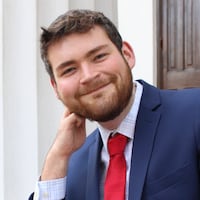Billed as a “red carpet” between Georgia Gwinnett College and downtown Lawrenceville, Collins Hill Extension will be well-traveled by students, investors and real estate agents.
Officials in the Gwinnett city foresee the recently opened 1.5-mile stretch becoming a hub for redevelopment, branding the two-lane road and the area around it as the College Corridor. It will not only link two popular areas of Lawrenceville, but it will allow the city to expand with new retail, office space and a mix of single-family homes and townhouses.
“It sheds new light on economic development in an area that has been struggling over the years,” City Manager Chuck Warbington said. “We’re seeing a lot of new interest from investors and developers in that area that want to redevelop.”
The $30-million project will include pocket parks along the corridor, as well as a playground for existing neighborhoods along Northdale Road. In addition to large sidewalks, the road will have bike lanes and access to multi-use trails.
“What I envision is an extension of what we’re seeing in the downtown area,” Warbington said. “There’s just a lot of interest in being a part of a walkable, small downtown type community.”
Just north of the Lawrenceville Depot, the road once forked into Northdale Road and North Clayton Street. Currently blocked off from traffic at several stretches, those two roads will end in cul-de-sacs but have access to Collins Hill Extension via roundabouts.
The city acquired all of the property where the corridor now runs, demolishing old homes and a few commercial buildings to make way for it, said Mayor David Still. After nearly a decade of planning the project, city officials estimate all roadwork around the extension will be completed sometime in mid- to late June, Warbington said.
Lawrenceville residents can expect to see major redevelopment along the road in the next one to two years, Still said.
Traveling from downtown Lawrenceville to Georgia Gwinnett College once required drivers to go up meandering streets or hop on Ga. 316. “The new road splits the difference between North Clayton Street and Northdale Road and just connects Collins Hill all the way into the downtown area,” Warbington said.
About 3,600 out of about 12,000 students at the four-year college lived in Lawrenceville in the fall 2020 semester, said Jackie Todd, director of public relations. Only about 1,000 students live in on-campus student housing, she said.
“In the past, there was downtown Lawrenceville and then there’s a college way over there,” Still said. “(The road) has been able to merge the community together and have everybody be able to enjoy the assets of both the downtown area and the college.”
Given its large sidewalks, multi-use trails and bike lanes, the corridor could also encourage students to check out downtown Lawrenceville’s restaurants and shops, said Hayley Howell, director of government relations at the college.
“I think it will certainly link that town-and-gown relationship we have,” Howell said. “... (Lawrenceville) offers so many businesses, restaurants, shops and fun things to do downtown, so I could only see that as a benefit for our students.”
About the Author
The Latest
Featured





